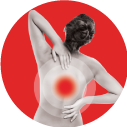
Can Depression Cause Symptoms of Lower Back Pain? Know All About It!
According to a recent study conducted at Rush University in Chicago, people suffering from chronic lower back pain can experience aggravated levels of the condition in case of spouse hostility, which is a Signs of Depression. The study, carried out by John Burns, Associate Chair for Research, Department of Behavioral Sciences, states that the chronic condition of lower back pain reasons can be intense due to a lack of understanding and empathy from one’s spouse.
Chronic lower back pain, as the name suggests, plagues the lower back region and carries various easily identifiable symptoms of low back pain, that include stiffness and decreased movement of the lower back. This particular pain-related condition can occur due to a variety of reasons and is also known to be a progressive disorder. In addition, people suffering from chronic lower back pain often are marred by arthritis, which not only adds to the pain and discomfort but also makes the treatment a more prolonged one.
The three main causes of lower back pain are...
1. Injuries and fractures2. Surgery
3. High-impact activities, including sports
Besides these above-mentioned causes, there exists a variety of environmental and lifestyle factors that contribute to the onset as well as the aggravation of this condition.
Some of the factors for lower back pain include...
1. Lack of daily exercise2. Stress and clinical depression
3. Overweight
4. Pregnancy
5. Smoking
As per the research, women suffering from spousal hostility and depression were found to be highly susceptible to severe back pain reasons, irrespective of the intensity of criticism and apathy delivered by the spouse.
As per observations, the chronic pain continued to increase for up to four hours after the post-criticism. It has also been noted that pain indicators, such as grimacing, groaning and straining, can further lead to additional hostile behaviour from the spouse.
According to John Burns, most studies of spouse and family interactions with people with chronic pain have focused on the positive effects of adequate social support. These (new) findings point toward the harmful effects of specific negative spouse communication directed toward pain patients. For the study, 71 couples participated and were interviewed for a ten-minute duration. These discussions were primarily focused on spousal perspectives in regard to the refinement of coping mechanisms for patients suffering from degenerative discs, spinal stenosis, and herniated disks.
The entire discussion process was designed to instigate conflict between the patient and his or her spouse. The research team then measured the degree of overt criticism and hostility from the spouse while simultaneously monitoring the patient’s pain intensity, physical symptoms of depression and pain behaviours. The results of the study proved that patients experienced increased levels of pain and furthermore reported a significant escalation in anxiety, anger, and sadness.
As the research activity progressed, it was observed that patients with higher depression scores were more prone to increased joint pain diseases as well as more susceptible to the impact of spousal criticism. While marital interventions and counselling are proven aids towards the betterment of relations, yet when it comes to symptoms of chronic lower back pain and other joint pain-related illnesses, a sustained regimen of medication is the right way to go.
This is where ThioQuest Gel comes into play. Developed using AlchemLife’s cutting-edge technology, this best anti-inflammatory knee pain gel carries the globally renowned benefits of linseed oil and menthol. Infused with anti-inflammatory and analgesic properties, ThioQuest acts as a quick and long-lasting neck and back pain relief tool that decreases rheumatic pain. It is non-greasy and non-staining formulation, which gets absorbed quickly and has fast pain-relieving action.
The article is based on the information available in public and which the author believes to be true. The author is not disseminating any information which the author believes or knows is confidential or in conflict with the privacy of any person. The views expressed or information supplied through this article is mere opinion and observation of the author. The author does not intend to defame, insult or cause loss or damage to anyone, in any manner, through this article.




































